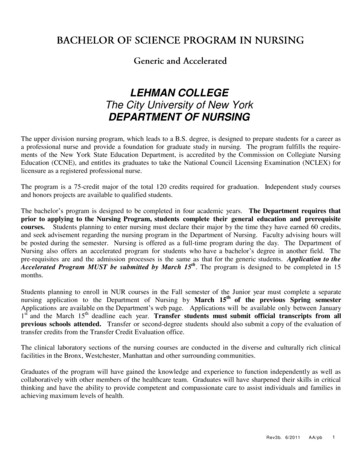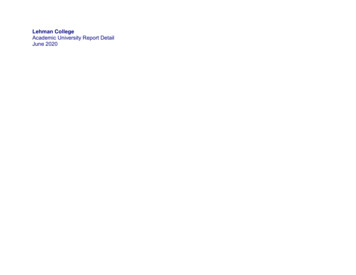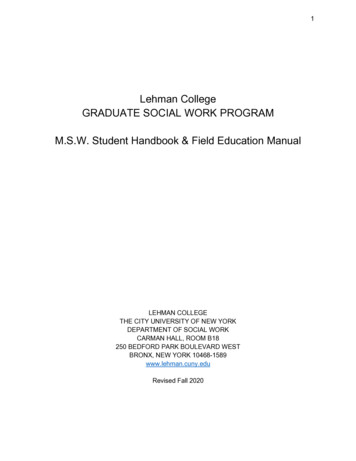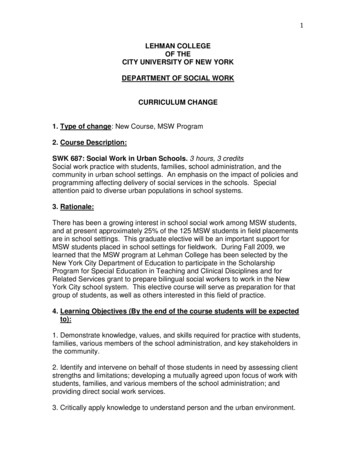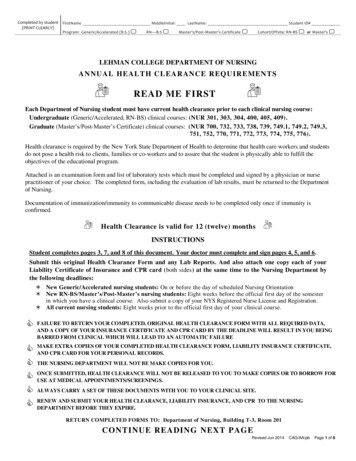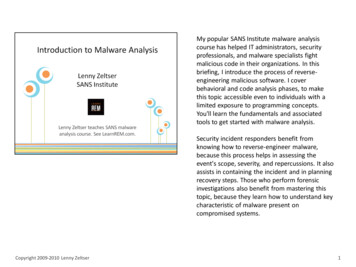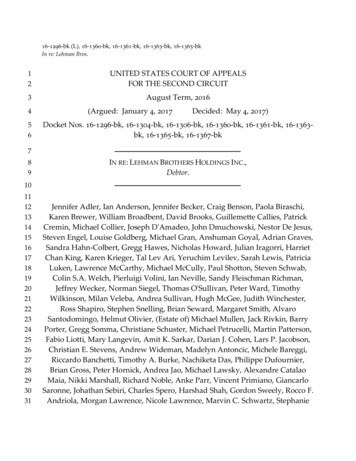
Transcription
16‐1296‐bk (L), 16‐1360‐bk, 16‐1361‐bk, 16‐1363‐bk, 16‐1365‐bkIn re: Lehman Bros.12UNITED STATES COURT OF APPEALSFOR THE SECOND CIRCUIT3August Term, 2016456(Argued: January 4, 2017Decided: May 4, 2017)Docket Nos. 16‐1296‐bk, 16‐1304‐bk, 16‐1306‐bk, 16‐1360‐bk, 16‐1361‐bk, 16‐1363‐bk, 16‐1365‐bk, 16‐1367‐bk789IN RE: LEHMAN BROTHERS HOLDINGS 293031Jennifer Adler, Ian Anderson, Jennifer Becker, Craig Benson, Paola Biraschi,Karen Brewer, William Broadbent, David Brooks, Guillemette Callies, PatrickCremin, Michael Collier, Joseph DʹAmadeo, John Dmuchowski, Nestor De Jesus,Steven Engel, Louise Goldberg, Michael Gran, Anshuman Goyal, Adrian Graves,Sandra Hahn‐Colbert, Gregg Hawes, Nicholas Howard, Julian Iragorri, HarrietChan King, Karen Krieger, Tal Lev Ari, Yeruchim Levilev, Sarah Lewis, PatriciaLuken, Lawrence McCarthy, Michael McCully, Paul Shotton, Steven Schwab,Colin S.A. Welch, Pierluigi Volini, Ian Neville, Sandy Fleischman Richman,Jeffrey Wecker, Norman Siegel, Thomas OʹSullivan, Peter Ward, TimothyWilkinson, Milan Veleba, Andrea Sullivan, Hugh McGee, Judith Winchester,Ross Shapiro, Stephen Snelling, Brian Seward, Margaret Smith, AlvaroSantodomingo, Helmut Olivier, (Estate of) Michael Mullen, Jack Rivkin, BarryPorter, Gregg Somma, Christiane Schuster, Michael Petrucelli, Martin Patterson,Fabio Liotti, Mary Langevin, Amit K. Sarkar, Darian J. Cohen, Lars P. Jacobson,Christian E. Stevens, Andrew Wideman, Madelyn Antoncic, Michele Bareggi,Riccardo Banchetti, Timothy A. Burke, Nachiketa Das, Philippe Dufournier,Brian Gross, Peter Hornick, Andrea Jao, Michael Lawsky, Alexandre CatalaoMaia, Nikki Marshall, Richard Noble, Anke Parr, Vincent Primiano, GiancarloSaronne, Johathan Sebiri, Charles Spero, Harshad Shah, Gordon Sweely, Rocco F.Andriola, Morgan Lawrence, Nicole Lawrence, Marvin C. Schwartz, Stephanie
16‐1296‐bk, 16‐1304‐bk, 16‐1306‐bk, 16‐1360‐bk, 16‐1361‐bk, 16‐1363‐bk, 16‐1365‐bk, 16‐1367‐bkIn re: Lehman Bros.123456Stiefel, Richard J. Glasebrook, II, Judith Ann Kenney, Richard Nackerson, HenryRamallo, Christian Reynolds, David I. Weiner, Richard Levine, Seth Finkel,Claimants‐Appellants,7v.89Lehman Brothers Holdings Inc.,Debtor‐Appellee.*Virgilio Casuple, Donald Boughrum, Brian Monahan, Roger Saks,Claimants,1011Before:JACOBS, SACK, AND CARNEY, Circuit Judges.When Lehman Brothers Holdings Inc. filed for Chapter 11 bankruptcy on1213September 15, 2008, thousands of its employees held restricted stock units, i.e.,14compensatory awards that gave employees a contingent right to own Lehman15Brothers common stock at the conclusion of a five‐year holding period. Because16these had been awarded between 2003 and 2008, the employees holding them at17the time Lehman Brothers filed for Chapter 11 did not receive common stock.18The filing effectively rendered their restricted stock units worthless. Many of the19affected employees filed proofs of claim in the bankruptcy proceeding seeking20cash payments in amounts reflecting the face value of the restricted stock units.21Lehman Brothers filed omnibus objections to these claims, and the bankruptcyThe Clerk of Court is respectfully directed to amend the official caption in this case toconform with the above caption.*2
16‐1296‐bk, 16‐1304‐bk, 16‐1306‐bk, 16‐1360‐bk, 16‐1361‐bk, 16‐1363‐bk, 16‐1365‐bk, 16‐1367‐bkIn re: Lehman Bros.1court (James M. Peck, Judge) sustained the objections on the ground, inter alia,2that the claims must be subordinated to the claims of general creditors pursuant3to 11 U.S.C. § 510(b) because the former arise from the purchase or sale of4securities. The district court (Richard J. Sullivan, Judge) affirmed. We conclude5that the claims at issue must be subordinated pursuant to 11 U.S.C. § 510(b)6because, within the meaning of that statute, (1) restricted stock units are7securities, (2) the claimants acquired them in a purchase, and (3) the claims for8damages arise from that purchase or the asserted rescission thereof.9Accordingly, the district courtʹs judgment RD J. SCHAGER, JR. (Andrew R.Goldenberg, on the briefs), Stamell &Schager, LLP, New York, NY, for theClaimant‐Appellants Jennifer Adler, IanAnderson, Jennifer Becker, Craig Benson, PaolaBiraschi, Karen Brewer, William Broadbent,David Brooks, Guillemette Callies, PatrickCremin, Michael Collier, Joseph DʹAmadeo,John Dmuchowski, Nestor De Jesus, StevenEngel, Louise Goldberg, Michael Gran,Anshuman Goyal, Adrian Graves, SandraHahn‐Colbert, Gregg Hawes, Nicholas Howard,Julian Iragorri, Harriet Chan King, KarenKrieger, Tal Lev Ari, Yeruchim Levilev, SarahLewis, Patricia Luken, Lawrence McCarthy,Michael McCully, Paul Shotton, Steven3
16‐1296‐bk, 16‐1304‐bk, 16‐1306‐bk, 16‐1360‐bk, 16‐1361‐bk, 16‐1363‐bk, 16‐1365‐bk, 16‐1367‐bkIn re: Lehman Bros.123456789101112Schwab, Colin S.A. Welch, Pierluigi Volini, IanNeville, Sandy Fleischman Richman, JeffreyWecker, Norman Siegel, Thomas OʹSullivan,Peter Ward, Timothy Wilkinson, Milan Veleba,Andrea Sullivan, Hugh McGee, JudithWinchester, Ross Shapiro, Stephen Snelling,Brian Seward, Margaret Smith, AlvaroSantodomingo, Helmut Olivier, (Estate of)Michael Mullen, Jack Rivkin, Barry Porter,Gregg Somma, Christiane Schuster, MichaelPetrucelli, Martin Patterson, Fabio Liotti, andMary Langevin.13141516171819202122232425LISA M. SOLOMON, Law Offices of Lisa M.Solomon, New York, NY, for the Claimants‐Appellants Madelyn Antoncic, MicheleBareggi, Riccardo Banchetti, Timothy A. Burke,Nachiketa Das, Philippe Dufournier, BrianGross, Peter Hornick, Andrea Jao, MichaelLawsky, Alexandre Catalao Maia, NikkiMarshall, Richard Noble, Anke Parr, VincentPrimiano, Giancarlo Saronne, Johathan Sebiri,Charles Spero, Harshad Shah, Gordon Sweely,Rocco F. Andriola, Amit K. Sarkar, Darian J.Cohen, Lars P. Jacobson, Christian E. Stevens,and Andrew Wideman.26272829303132333435DEBORAH E. LANS, Cohen Clair LansGreifer Thorpe & Rottenstreich LLP, NewYork, NY (Eugene Neal Kaplan, KaplanLandau, LLP, New York, NY, on the briefs),for the Claimants‐Appellants Marvin C.Schwartz, Stephanie Stiefel, Richard J.Glasebrook, II, Judith Ann Kenney, RichardNackerson, Henry Ramallo, ChristianReynolds, David I. Weiner, Richard Levine, andSeth Finkel.4
16‐1296‐bk, 16‐1304‐bk, 16‐1306‐bk, 16‐1360‐bk, 16‐1361‐bk, 16‐1363‐bk, 16‐1365‐bk, 16‐1367‐bkIn re: Lehman Bros.RALPH I. MILLER, Weil, Gotshal & MangesLLP, New York, NY, for Debtor‐AppelleeLehman Brothers Holdings Inc.12345SACK, Circuit Judge:It is not uncommon for corporate employers to compensate their high‐6ranking employees not only with cash, but also with equity in the corporation.7Such arrangements align the employeesʹ financial incentives with those of the8company: If the company succeeds financially, so too do its stake‐holding9employees; but if the company falters—even to and beyond the point of10bankruptcy—its employees bear some of the loss. Prior to its bankruptcy filing,11Lehman Brothers Holdings Inc. (ʺLehman Brothersʺ) adopted this approach,12compensating many of its employees in part with restricted stock units (ʺRSUsʺ),13which gave them a contingent right to own Lehman Brothers common stock at14the conclusion of a five‐year holding period. The holder of an RSU had risk and15return expectations similar to those of a shareholder; he or she would ultimately16benefit from any increase in the stock price or suffer from any decline.5
16‐1296‐bk, 16‐1304‐bk, 16‐1306‐bk, 16‐1360‐bk, 16‐1361‐bk, 16‐1363‐bk, 16‐1365‐bk, 16‐1367‐bkIn re: Lehman Bros.When Lehman Brothers filed for Chapter 11 bankruptcy on September 15,122008—the largest bankruptcy filing in United States history1—thousands of its3employees were holding RSUs that had been awarded over the preceding five4years, but that had not yet vested and had therefore apparently been rendered5worthless by the bankruptcy filing. Many of these employees filed proofs of6claim in the Chapter 11 proceeding seeking cash payments in the amounts of and7as substitutes for compensation they had been paid in RSUs. Lehman Brothers8filed omnibus objections to the claims, and the United States Bankruptcy Court9for the Southern District of New York (James M. Peck, Judge) sustained these10objections on two alternative grounds. First, it concluded that because the claims11arise from the purchase or sale of securities, they must be subordinated to the12claims of general creditors pursuant to section 510(b) of the Bankruptcy Code, 1113U.S.C. § 510(b). Second, the court decided that because an RSU is an ʺequity14security,ʺ 11 U.S.C. § 101(16), the employeesʹ claims were disallowed insofar as15the claimants, as equity security holders, may assert only proofs of interest, notSee ANZ Sec., Inc. v. Giddens (In re Lehman Bros. Inc.), 808 F.3d 942, 944 (2d Cir. 2015)(ʺOn September 15, 2008, Lehman Holdings filed for Chapter 11 bankruptcyprotection—the largest bankruptcy filing in U.S. history.ʺ).16
16‐1296‐bk, 16‐1304‐bk, 16‐1306‐bk, 16‐1360‐bk, 16‐1361‐bk, 16‐1363‐bk, 16‐1365‐bk, 16‐1367‐bkIn re: Lehman Bros.1proofs of claim. The United States District Court for the Southern District of2New York (Richard J. Sullivan, Judge) affirmed on both grounds.We note at the outset that we need not determine whether an RSU is an34ʺequity securityʺ pursuant to 11 U.S.C. § 101(16), because, even if it is, RSU5holders are not barred from asserting proofs of claim—such as the breach‐of‐6contract claims asserted here—inasmuch as at least some of their claims are not7duplicative of proofs of interest. We conclude, however, that Lehman Brothersʹ8omnibus objections must nonetheless be sustained on the alternative ground9that, pursuant to section 510(b), the claims must be subordinated to the claims of10general creditors because, for purpose of this statute, (1) RSUs are securities, (2)11the claimants acquired them in a purchase, and (3) the claims for damages arise12from those purchases or the asserted rescissions thereof.BACKGROUND13Lehman Brothers paid many of its employees a portion of their1415compensation in RSUs,2 equity awards that gave each of the recipient employees16a contingent right to own Lehman Brothers common stock five years afterLehman Brothers awarded RSUs to United States employees and contingent stockawards to overseas employees. These forms of equity, though different in name, wereidentical in substance.27
16‐1296‐bk, 16‐1304‐bk, 16‐1306‐bk, 16‐1360‐bk, 16‐1361‐bk, 16‐1363‐bk, 16‐1365‐bk, 16‐1367‐bkIn re: Lehman Bros.1issuance of each RSU so long as certain employment‐related conditions were2met. When Lehman Brothers filed for Chapter 11 bankruptcy on September 15,32008, many of its employees were holding RSUs that had not yet vested. They4filed proofs of claim in the bankruptcy proceedings for cash payments equivalent5to the amounts they had received in RSUs.6The Program7The RSUs were awarded in accordance with Lehman Brothersʹ Equity8Award Program (the ʺProgramʺ), which was administered by Lehman Brothersʹ9Board of Directorsʹ Compensation and Benefits Committee (the ʺCommitteeʺ).10The Programʹs purpose was to give Lehman Brothersʹ employees (1) a financial11stake in the company that aligned their interests with those of the company, and12(2) a financial incentive to remain with the company until the RSUs matured.13In accordance with those goals, the Program gave Lehman Brothers14discretion to pay some of its employees a portion of their compensation in15equity‐based awards, including RSUs.3 ʺAt [Lehman Brothersʹ] option, a portion16of [an employeeʹs] total compensation . . . may be payable in the form ofNear the end of each fiscal year, employees received a brochure with a scheduleidentifying the portion of their compensation they would be paid in RSUs, based on theemployeeʹs corporate title and compensation level.38
16‐1296‐bk, 16‐1304‐bk, 16‐1306‐bk, 16‐1360‐bk, 16‐1361‐bk, 16‐1363‐bk, 16‐1365‐bk, 16‐1367‐bkIn re: Lehman Bros.1conditional equity awards ([RSUs], stock options, or other equity awards)2pursuant to the [Program].ʺ Joint Appʹx (ʺJAʺ) at 7 ¶ 2. And where Lehman3Brothers had employment contracts with its employees, those contracts stated4that ʺ[a]t the Firmʹs discretion, a portion of [the employeesʹ] total . . .5compensation . . . will be [or may be] payable in conditional equity awards6([RSUs] and/or other equity awards) pursuant to the [Program].ʺ Id. In practice,7RSUs were awarded near the end of each year to some employees. These RSU8holders were entitled to Lehman Brothers common stock at the conclusion of a9five‐year holding period, assuming they met certain employment‐related10conditions. Employees whose RSUs vested at the end of the five‐year holding11period could dispose of their shares of common stock as they saw fit.12The Program was governed by the terms of various documents, including13the Employee Incentive Plan (the ʺPlanʺ). Section 8(b) of the Plan provides in14pertinent part that Lehman Brothersʹ RSU obligation is limited to delivery of the15stock, and does not include payment of cash:9
16‐1296‐bk, 16‐1304‐bk, 16‐1306‐bk, 16‐1360‐bk, 16‐1361‐bk, 16‐1363‐bk, 16‐1365‐bk, 16‐1367‐bkIn re: Lehman Bros.12345678910With respect to any [RSUs] granted under the Plan, the obligations of theCompany or any Subsidiary are limited solely to the delivery of shares ofCommon Stock on the date when such shares of Common Stock are due tobe delivered under each Agreement, and in no event shall the Companyor any Subsidiary become obligated to pay cash in respect of suchobligation (except that the Company or any Subsidiary may pay to [Plan]Participants amounts in cash in respect of a restricted stock unit equal tocash dividends paid to a holder of shares of Common Stock, for fractionalshares or for any amounts payable in cash upon the occurrence of aChange in Control).11Id. at 2890. Section 13(b) further provides that ʺ[t]he grant of an Award shall not12be construed as giving a Participant the rights of a stockholder of Common Stock13unless and until shares of Common Stock have been issued to Participants14pursuant to Awards hereunder.ʺ Id. Section 16 provides additional information15about the rights of Plan participants, and authorizes the creation of trusts to meet16Plan obligations:1718192021222324With respect to any payments not yet made to a Participant, . . . nothingherein contained shall give any Participant any rights that are greater thanthose of a general creditor of the Company. In its sole discretion, theCommittee may authorize the creation of trusts or other arrangements tomeet the obligations created under the Plan to deliver Common Stock orpayments in lieu thereof . . . .Id. at 2891.During the five‐year holding period, the common stock was held in a trust,25established and governed by a Trust Agreement, which provides that the26ʺassets[,] including [s]hares, that shall be held thereinʺ are ʺsubject to the claims10
16‐1296‐bk, 16‐1304‐bk, 16‐1306‐bk, 16‐1360‐bk, 16‐1361‐bk, 16‐1363‐bk, 16‐1365‐bk, 16‐1367‐bkIn re: Lehman Bros.1of the Companyʹs general creditors in the event the Company becomes2insolvent . . . until paid to Participants . . . in such manner and at such times as3the Company may specify to fulfill [its] obligations under the Plans.ʺ Id. at 1835.4Section 1(e) of the Trust Agreement subjects the trust assets to claims of general5creditors:67891011121314The principal of the Trust, and any earnings thereon, . . . shall be usedexclusively for the uses and purposes of Participants and general creditorsas herein set forth. Participants shall have no preferred claim on, or anybeneficial ownership interest in, any assets of the Trust. Any rightscreated under the Plans and this Agreement shall be mere unsecuredcontractual rights of Participants against the Company. Any assets heldby the Trust will be subject to the claims of the Companyʹs generalcreditors under federal and state law in the event the Company becomesinsolvent . . . .15Id. at 1836. Section 3(b) reiterates that, ʺ[a]t all times during the continuance of16this Trust, . . . the principal and income of the Trust shall be subject to claims of17general creditors of the Company under federal and state lawʺ in accordance18with the provisions of the Trust Agreement. Id. at 1838.19Program documents for the years 2003 and 2004 (but not after) included20provisions (ʺSubordination Provisionsʺ) explicitly stating that, ʺin the event of21bankruptcy,ʺ RSU‐holder claims would be ʺdeemed . . . claims for damages22arising from the purchase or sale of [Lehman Brothers c]ommon [s]tock[] within23the meaning of section 510(b) . . and shall have in such bankruptcy the same11
16‐1296‐bk, 16‐1304‐bk, 16‐1306‐bk, 16‐1360‐bk, 16‐1361‐bk, 16‐1363‐bk, 16‐1365‐bk, 16‐1367‐bkIn re: Lehman Bros.1priority as, and no greater priority than, common stock interests in [Lehman2Brothers].ʺ Id. at 52 ¶ 10, 57 ¶ 10. The record on appeal does not appear to3disclose why, after 2004, the Program documents no longer included these4Subordination Provisions.5Employees received annual notice of the Programʹs terms by way of6information packets containing a summary of the Programʹs material terms and a7Program brochure.4 These brochures stated, inter alia, that an RSU ʺrepresents [a]8conditional right to receive one share of Lehman Brothers common stock,ʺ which9ʺthe firm holds on [an employeeʹs] behalf for five years, which [he or she] will be10entitled to receive at that time, provided [the employee] meet[s] certain terms11and conditions.ʺ Id. at 36, 37.Although common stock was not issued until the completion of a five‐year1213period,5 RSU holders received benefits similar to those of shareholders. They14were paid dividends in the form of additional RSUs during the five‐year period,15and Program documents indicate that they could direct the trusteeʹs votes on theEmployees were also notified of the Programʹs terms via face‐to‐facecommunications, conference calls, and e‐mail.4RSU holders did not incur income tax liability on the value of their RSUs until theyvested.512
16‐1296‐bk, 16‐1304‐bk, 16‐1306‐bk, 16‐1360‐bk, 16‐1361‐bk, 16‐1363‐bk, 16‐1365‐bk, 16‐1367‐bkIn re: Lehman Bros.1shares held in the trust in proportion to the number of RSUs each owned. The2value of their RSUs, moreover, was directly tied to the value of Lehman Brothersʹ3common stock: If the stockʹs value increased during the five‐year holding4period, RSU holders would benefit from that increase; if the stockʹs value5decreased during that same period, they would ultimately bear the loss.6The Dispute7When Lehman Brothers filed for Chapter 11 bankruptcy on September 15,82008, thousands of Lehman Brothers employees were holding RSUs that had not9yet vested, having been granted for services performed between 2003 and 2008.10Many RSU holders filed proofs of claim in the bankruptcy proceeding seeking11cash payments equivalent to the amounts previously paid to them in RSUs. In12response, Lehman Brothers filed fourteen omnibus objections seeking to13reclassify over 3,000 RSU‐based claims as equity interests and to subordinate14them to the claims of general creditors. Most of the claimants did not oppose15Lehman Brothersʹ objections, and accordingly, the United States Bankruptcy16Court for the Southern District of New York reclassified their claims as equity.1718But 222 of the claimants opposed the objections. The bankruptcy courttherefore held a hearing on December 21, 2011, where it indicated that it would13
16‐1296‐bk, 16‐1304‐bk, 16‐1306‐bk, 16‐1360‐bk, 16‐1361‐bk, 16‐1363‐bk, 16‐1365‐bk, 16‐1367‐bkIn re: Lehman Bros.1follow the reasoning of In re Enron Corp., 341 B.R. 141 (Bankr. S.D.N.Y. 2006),2which held ʺthat claims for damages that arise from the ownership of employee3stock options . . . should be subordinated [to the claims of general creditors]4pursuant to section 510(b),ʺ id. at 144, unless the claimants could establish that5their RSUs were meaningfully different fr
18 Luken, Lawrence McCarthy, Michael McCully, Paul Shotton, Steven Schwab, 19 . 30 Saronne, Johathan Sebiri, Charles Spero, Harshad Shah, Gordon Sweely, Rocco F. 31 . Second, the court decided

